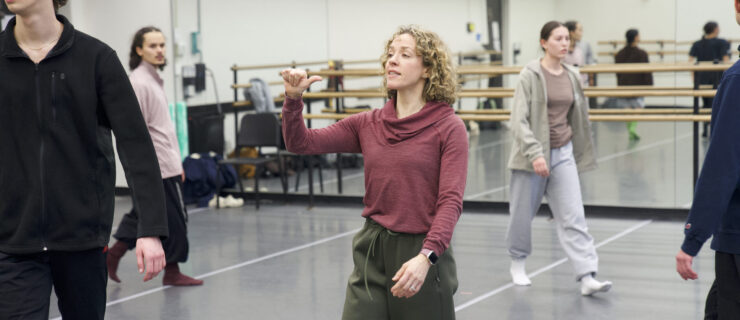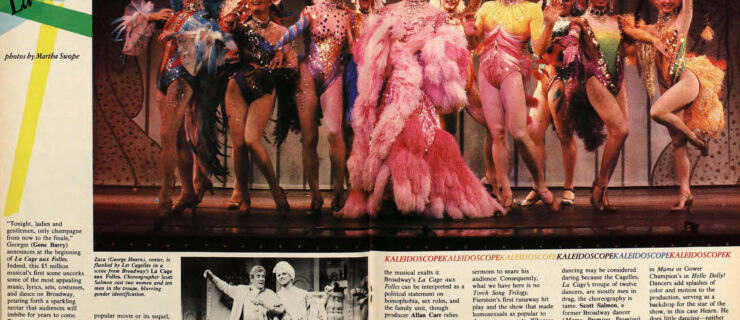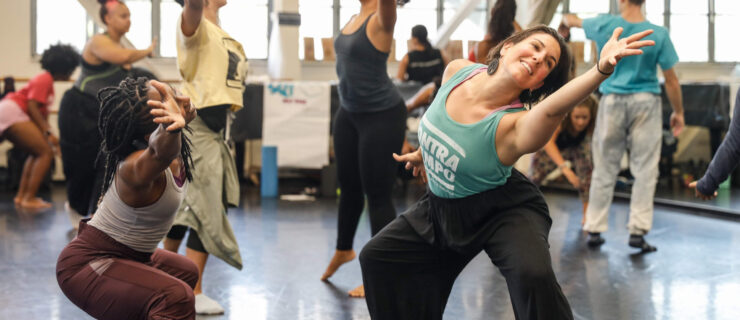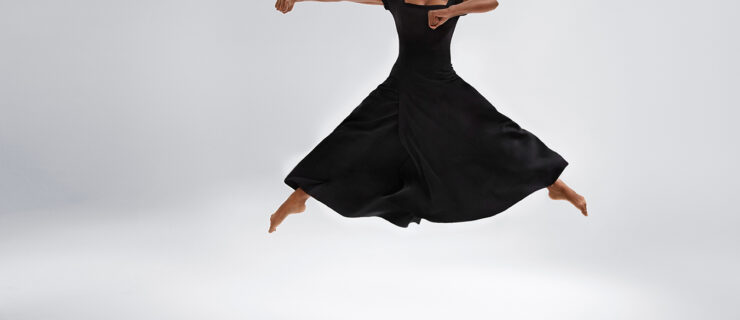When Words Hurt
When New York Times critic Alastair Macaulay wrote in his review of New York City Ballet’s Nutcracker that “Jenifer Ringer, as the Sugar Plum Fairy, looked as if she’d eaten one sugar plum too many,” the dance world yelled foul. Ringer, a celebrated principal with NYCB, has graced the cover of Dance Magazine four times (as many as Balanchine great Violette Verdy), and recently starred in a fashion spread in Elle. The event, dubbed “Sugarplumgate,” left dancers all over the country looking at their own reflections wondering, If she’s fat, then what am I? Blogs and message boards on the internet lit up with emotional cries on Ringer’s behalf, but the call to arms was about more than Ringer as an individual. It was an opportunity to discuss the harshness of the criticism of dancers’ bodies every day. Overnight, Ringer became a symbol of poise in the face of criticism. Appearing in interviews on The Today Show and Oprah shortly after Black Swan’s unhinged Nina Sayers was thrust into popular culture, here stood Jenifer Ringer, the picture of class and maturity, to gently place our feet back on the ground.
While body criticism is a daily event in the dance world, it rarely occurs as publicly as it did to Ringer. Most often these statements are made quietly behind the closed door of an artistic director’s office, or within the sacred space of a dance studio, far from the ears of the outside world. It seems every dancer is “too” something—too tall, too short, too fat, too muscular. As participants in a visual art form, most dancers will inevitably be told that there is some aspect of their bodies that isn’t perfect, because whose is?
The language of body criticism in dance is uniquely its own, full of implied meanings and carefully chosen words. When the issue is something unchangeable, the words used are straightforward, like being too “tall” or “short,” but when the issue is weight-related the adjectives become more varied. Teachers and directors will tell dancers they are “too loose,” “soft,” or “thick,” or advise them to “tighten up,” or “get lean.” In each of these instances the dancer hears only one word—fat. As a result, the true meaning often gets lost in translation.
“I’ve been with Washington Ballet 10 years and every year we’ve had a conversation about my body,” says Morgann Rose, whose athletic build has presented challenges in ballet. In conferences with her director, Rose has often had trouble understanding exactly what she needs to change about her body because of the vague word choices used to describe her problems.
Often told she needs to “lean up” or “lose five pounds,” Rose has found that by asking questions about what specifically she needs to work on, the language barrier can be broken and proactive solutions can be agreed on. Through her questions, she discovered that her director’s concern was that her upper body appeared thicker than the other girls’ onstage because of her muscular build, and that those muscles needed to be lengthened. “Lean and lengthen are different,” Rose points out. “Lean means lose weight; lengthen means lengthen—and I can totally do that. You can do certain exercises and hold your upper body in a way that will help change the look and line of your muscle.”
Unfortunately, not every person on the artistic staff uses “nice” language. Harsh words can be destructive to a fragile ego, especially when solutions aren’t presented. For Jenny Gilmore, at her former company constant criticism left her feeling helpless. She was too ashamed to reach out for help, resulting in her developing bulimia, and ultimately ending her career.
“One thing that was said was that I was a workman’s comp liability because I could potentially hurt the men’s backs trying to lift me,” she says. “It was brutal and embarrassing and there was nothing constructive about it.” On another occasion, shortly after Gilmore had sustained hip surgery and four weeks spent healing in bed that followed, one particular staff member confronted her. She remembers him saying, “Look at your stomach. It’s disgusting.”
Criticism can go far beyond words. In Gilmore’s case, she would be pulled her out of rehearsal in front of the entire company if she didn’t look like she had lost weight. “I would have to wear a white leotard and pink tights so they could see my hip bones. It just felt constant,” she says.
For Francine E. Ott, a modern dancer in New York City, her weight has been an issue for most of her career. And while comments about her body made by teachers and directors have been hurtful, the most stinging comments often come from peers criticizing themselves. “I mean these are teeny-tiny people and they’re going on about their bodies, saying things like ‘I don’t even want to look at myself in the mirror,’ and I’m thinking in my head, How is that supposed to make me feel?”
Regardless of where the body criticism comes from, it is felt deeply by the person receiving it. Ringer told Ann Curry on The Today Show that she felt “embarrassed” by what Macaulay said, a sentiment Gilmore relates to. “I felt extremely embarrassed, I felt like everybody knew. I was the fat kid,” Gilmore recalls, “I was just so humiliated.”
Rose felt it most intensely during and immediately after puberty when her weight fluctuated most. “The mental strain and the lack of confidence through those bad times really took a toll on my dancing,” she says. “You look in the mirror and you don’t like what you see.” As she matured she began to see that the physicality she is often criticized for is actually what makes her the dependable dancer that gets her contract renewed each season. “When I’m out there I’m the most powerful dancer onstage because I’ve got muscular strength,” she says. “A lot of the parts that I’m cast in are based on that strength. If I lose weight, I’m not going to have that strength. It’s not fair when someone says, ‘You need to lose that.’ ”
Criticism can help improve an artist, but it has to come from a place of genuine good will. “When you label a person, they don’t have any room to get out of the box that you’ve put them in,” says Ott. “But if they are being spoken to with love or because the person really sees more in them, then they will work with them.”
The most dangerous thing about body criticism in dance is the silence that surrounds it. Each of the dancers interviewed longed to have a mentor who could have helped them through those difficult moments. But the subject is still taboo, and very few of those who have received such criticism have the confidence to counter it as Ringer did. Without support networks, they will continue to cope poorly. As long as body issues are regarded with a sense of failure in the dance world, disordered eating will take the place of sound nutritional consumption, embarrassment will squelch the desire to get help, and potentially beautiful careers will go unfulfilled. Macaulay may have been out of line, but he got us talking, and the dialogue needs to continue.
Kathleen McGuire, a Pittsburgh-based dance writer, was trained as a pre-professional dancer.
Morgann Rose of The Washington Ballet. Photo by Steve Vaccariello, Courtesy TWB.
Dealing with Criticism
Advice from the dancers
Ask questions
about the specific changes you need to be making and for resources to help you get there.
Do your homework.
“Go to the bookstore and look at books on different diets, nutrition, and different body types,” says Morgann Rose. “Don’t be afraid to ask questions.”
Talk to someone
about it, whether it’s a friend, a relative, a therapist, or a nutritionist.
Love yourself first.
“If you get to the point of saying ‘I want to lose a little weight,’ that process you go through has to be nurturing and healthy,” says Francine Ott. “Otherwise you will just go back to where you were before.”
Every school and company is not perfect for every dancer. Seek out a place where you feel understood and encouraged to succeed.
Keep it in perspective. Jenny Gilmore:
“There will probably be a time that you’re going to have a weight talk. So when it happens you can be like, OK I expected this; what do we need to do?”
Make a game plan
for yourself with realistic, achievable goals and stick to it.




